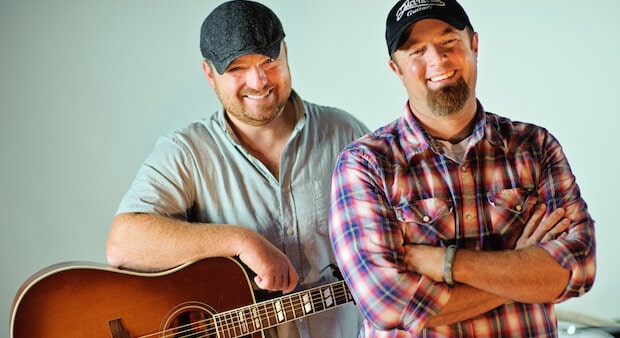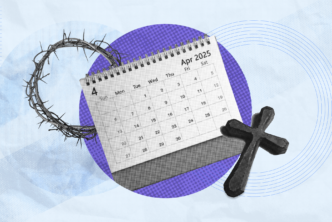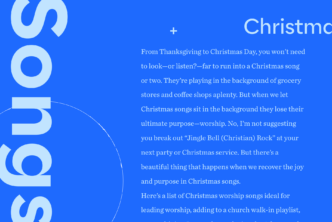Shane Barnard and Shane Everett—better known as the popular worship duo Shane & Shane—have spent a lot of time in the Psalms lately. Their latest album, Psalms II, is the result of a close study of the Psalter. I sat down with the guys, and Shane Barnard explained how his song-writing is intimately connected to Bible study, how familiar Psalms gain new power in moments of desperation, and how singing the Gospel can be a sanctifying experience.
What was your process for writing songs based on the Psalms?
It was a crazy time for me personally. My wife and I had just adopted a child. We were moving and were in the midst of selling our house. Honestly, it was a desperate time for us. And you know, it’s really great to be in the Psalms when you’re in that kind of place.
A lot of these Psalms are familiar, they kind of live in your periphery. You see them on coffee cups or hanging on the wall. But when you’re in a desperate place, passages like Psalm 23 suddenly become very real. For instance, Psalm 63: “O God, you are my God; earnestly I seek you; my soul thirsts for you; my flesh faints for you, as in a dry and weary land where there is no water.” (ESV) Suddenly that passage became something to cling to.
So as I worked through the Psalms, I just started looking for some kind of melody and rhythm to wrap them in. Once we knew when we were going to record, we had a band scheduled, we had the dates set aside, I was just scrapping for anything.
How does your personal Bible study influence your songwriting?
It’s everything. I rarely start a song without a trigger from the Scriptures. At the end of the day, I don’t have anything to say. I have to go somewhere there’s something worth writing about: God’s Word. If I’m gonna say something, I want it to be true, and the only place I know where I can find something that is surely true is the Scriptures.
Romans 1:16 says “the Gospel is the power of God to save.”(ESV) That’s why Shane and I use songs to talk about the Gospel. We pray that God will use our music to save and sanctify as people drive in their cars in the morning and their kids are screaming in the back. We write songs drawn from God’s Word, because we want God’s Word to do its work through our music.
I relied on Charles Spurgeon’s commentary The Treasury of David a lot. His commentary through the Psalms is practically a commentary through the life of Christ! It was really sweet to think about Jesus and to make these songs and to read these Psalms with Christ as the center.
I actually wrote a couple of these songs with Joe Rigby, who teaches at Bethlehem College and Seminary in Minneapolis. He’s a phenomenal teacher and it was really fun to write with someone who isn’t necessarily musically gifted, but really has a way with words and truly understands God’s Word. As we worked through the Psalms, we kept seeing Christ there. We even thought about naming the album or making the cover image something to do with Christ being in the Psalms. Probably nine out of twelve songs are about just that.
From your study of the Psalms, is there anything the psalmists experienced in their worship that the modern church is missing out on?
I don’t even know if we have a grid for some of the stuff in the Psalms. Try wrapping your head around the background story of Psalm 46. The nation of Judah is under siege by the Assyrians. The walls are surrounded by these brutal warriors —people known for skinning people. King Hezekiah is freaking out; he has no idea what to do.
That’s the significance of those opening words in that psalm: “Be still and know that I am God.” At the end of the day God says I’m gonna fight the battle for you. And he does. He sends an angel who comes down and destroys 180,000 men!
From what I’ve read, most scholars think King Hezekiah actually brought the nation out there afterwards. And that’s when he says in Psalm 46:8–10: “Come, behold the works of the Lord, how he has brought desolations on the earth. He makes wars cease to the end of the earth; he breaks the bow and shatters the spear; he burns the chariots with fire. Be still, and know that I am God. I will be exalted among the nations, I will be exalted in the earth!” (ESV)
That’s what happens when you take those coffee-cup Scriptures and place them in front of their historical backdrop. What would it be like to walk around the carcasses of 180,000 men, and to hear God say, “Be still and know that I am God!”
That was one of the challenges, trying to make the music feel like that. To bring that across. We try to make that song in particular feel almost like a movie soundtrack to portray some of that imagery. We want to capture that in our songs, because people today feel surrounded, too. We may have different giants beating on the door, but the same God who was in control of that moment captured in Psalm 46 is in control of your cancer and your job loss and your marriage that feels like it’s a wreck.
Was there anything personally raw or honest for you in the same way it was for the psalmist?
Totally. The Psalms are worship songs, and one of the benefits of being a worship leader is that you sing these songs all the time, and it has a diagnostic effect on your heart.
For instance, I read Psalm 63, and my inner man can honestly say with the psalmist, “O God, you are my God; earnestly I seek you; my soul thirsts for you; my flesh faints for you, as in a dry and weary land where there is no water. So I have looked upon you in the sanctuary, beholding your power and glory. Because your steadfast love is better than life, my lips will praise you; So I will bless you as long as I live; in your name I will lift up my hands.” (ESV) I can genuinely get behind that. That’s what I want to be true of myself.
But some of the rawness that you’re asking about happens as a result of saying that. As I say and sing those things, I realize that if I’m being honest, that prayer would read differently. “O God, earnestly I seek your things; my soul thirsts for comfort; My flesh faints for approval. Because I’m convinced that my life is better than your love, I have a hard time singing, praising you with my lips.” When I sing these songs, it’s hard for me to not be honest.
Or take Psalm 27: “One thing I ask and one thing I seek, to dwell in the house of the Lord forever.” (ESV) Is that really the thing I’m asking? I mean, if there’s one thing I’m asking for today, that’s definitely not it! What I’m really asking for is just to get through the day, pop some popcorn, and just watch Netflix with my wife. So these songs are raw and diagnostic in that sense. They reveal that my heart is thirsty for something, and what I really want to be thirsty for is God.
***
Download Shane & Shane’s “Psalm 46,” from their new album Psalms II for free. And check out one of the resources the guys used to create their latest album, Charles Spurgeon’s classic The Treasury of David.





